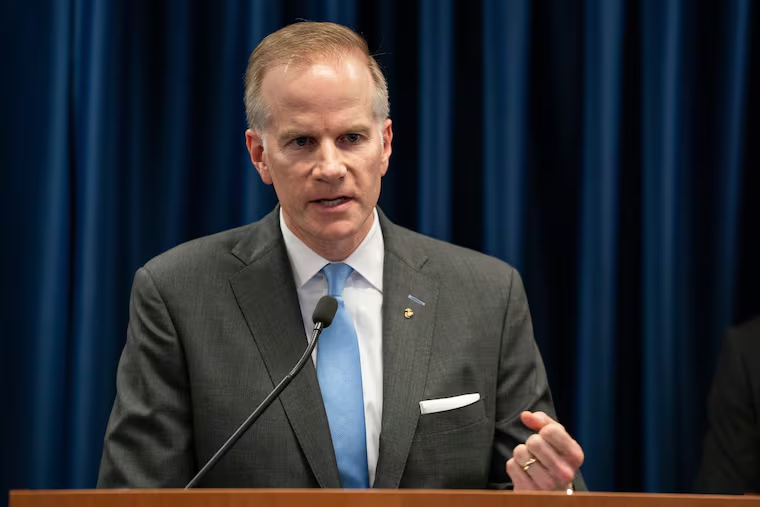Philadelphia released undocumented man, charged with assault, despite receiving federal arrest warrant
The U.S. Attorney's ire stems from an incident that holds the Kenney administration’s Sanctuary City policies up for criticism.

U.S. Attorney William M. McSwain says he has a question for Philadelphia Mayor Jim Kenney:
Where is Alan Torres Gomez, an undocumented Mexican man twice charged with assault?
McSwain’s ire stems from an incident that holds the Kenney administration’s “sanctuary city” policies up for criticism — Gomez’s release from local custody despite the fact that federal immigration authorities provided the city with a signed judicial arrest warrant to ensure he would be held.
Those federal warrants are the Kenney administration’s standard for keeping people in custody beyond the time they would normally be released from jails and lockups. The city does not honor detainers from U.S. Immigration and Customs Enforcement, deeming them insufficient, but says it always cooperates with warrants signed by a judge.
McSwain said that’s not true, that in this 2018 case, city officials ignored a warrant for a man who had been most recently charged with assault and recklessly endangering another person, and who had twice been deported from the United States.
Managing Director Brian Abernathy said Gomez was released by mistake.
“There was a clerical error," Abernathy said. "Somebody screwed up. That person was held accountable. I cannot blame ICE for this error. It was not their fault. Frankly, I was furious when it was brought to my attention.”
The administration respects judicial arrest warrants, he added, and has put policies and directives in place to prevent such a mistake in the future.
Kenney spokesperson Mike Dunn said, “The city does not ignore federal judicial warrants.”
In an interview Friday, McSwain said that if the city made a mistake, then “it’s an entirely predictable mistake,” one that’s “outrageous” and “dangerous.”
“Their first reaction to any kind of paperwork with ‘ICE’ on it is to throw it in the garbage,” McSwain said.
He criticized the city government for operating what he called two separate systems of law: one for U.S. citizens, who are always liable when a warrant is filed, and a preferential one for undocumented people, who are not.
“Alan Torres Gomez is out there in the community somewhere, because Philadelphia ignored a federal arrest warrant,” McSwain said. “God forbid he commits another crime.”
The incident came to light this week when, at an unrelated news conference, McSwain fielded a question about the sentencing of Juan Ramon Vasquez, 50, an undocumented Honduran who raped a 5-year-old girl after he was released from city custody.
Vasquez had been arrested for aggravated assault in 2014, then freed the next year when the charges were dropped, and the city, as is its policy, declined to honor a detainer from ICE. ICE wanted him held for possible deportation.
On Tuesday, Vasquez was sentenced in federal court to two years in prison for re-entering the country after deportation, consecutive to the eight to 20 years he’s serving for sexual assault.
His case has been a flash point in a bitter national debate over sanctuary city policies.
Philadelphia city officials maintain that without a warrant, they have no authority to hold anyone beyond the time they would normally be released from custody. Further, Kenney and Police Commissioner Richard Ross have argued that making local police help find and deport undocumented residents makes it less likely that people who lack legal status will come forward to report crimes — endangering the wider community.
The Kenney and Trump administrations continue to battle in federal court over the city’s right to receive law-enforcement grants even if it refuses to help U.S. authorities enforce immigration laws. In June, a federal judge in Philadelphia barred the Justice Department from seeking to compel the city to comply by withholding the grants, and this month the U.S. Court of Appeals for the Third Circuit largely upheld that ruling.
Abernathy said that far from creating two separate legal systems, the city’s policies seek to treat everyone the same.
“If your son or daughter got arrested, and a judge ordered them released, we would release them,” Abernathy said. “There’s no reason to hold someone based on a piece on paper that’s signed by some ICE officer.”
Gomez, 29, had been deported in 2009 and 2016, before he came into contact with Philadelphia police, court records show.
On Nov. 25, 2017, he was arrested and charged with assault, recklessly endangering another person, and making terroristic threats, court records show. The records don’t make clear how that case was resolved.
On Sept. 14, 2018, Gomez was arrested and charged with assault and recklessly endangering another person. At that point, ICE learned through a fingerprint match that Gomez, who also goes by the name Alan Torres, was in city custody.
An arrest warrant was signed by U.S. Magistrate Judge Marilyn Heffley, a copy of the warrant shows, and then faxed to the Curran-Fromhold Correctional Facility, where Gomez was being held.
City officials confirmed receipt of the warrant the same day, according to the U.S. Attorney’s Office. The accompanying criminal complaint said Gomez had illegally reentered the United States; federal authorities intended to start deportation proceedings.
McSwain said his office expected to be notified when Gomez was about to be released. Instead, after more than two months in custody, Gomez was freed on Nov. 26, 2018, the records show.
The U.S. Attorney’s Office found out when a staffer inquired about the case, McSwain said.
“If you really want to know what sanctuary city policy means,” he said, “it’s not just about having a ‘welcoming environment.’ … The world is upside down if in the criminal-justice system, we are going to give favorable treatment to illegal aliens who have no right to be in this country in the first place, and who are also committing additional crimes.”
Staff writer Dylan Purcell contributed to this article